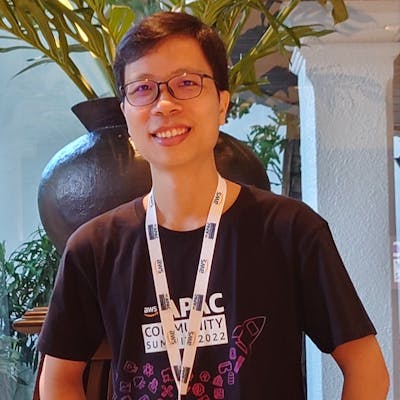Abstract
When creating new Auto scaling group, there were four issues that I faced:
kubeletfailed to start due to an error listing AWS instances from metadataIPAM failed to start (no secondary IP addresses in the ASG nodes)
Pods were not able to connect to public URL although outbound allows all traffic to 0.0.0.0
Outbound is a matter for L-IPAMD (IP Address Manager systemD service)
- Let's figure out why
Table Of Contents
🚀 Security groups for your VPC
This is one of the important things for Pod communications
Security groups are stateful — if you send a request from your instance, the response traffic for that request is allowed to flow in regardless of inbound security group rules. Responses to allowed inbound traffic are allowed to flow out, regardless of outbound rules.
Instances associated with a security group can't talk to each other unless you add rules allowing the traffic (exception: the default security group has these rules by default).

By default, when you create a network interface, it's associated with the default security group for the VPC, unless you specify a different security group
When you specify a security group as the source or destination for a rule, the rule affects all instances that are associated with the security group. Incoming traffic is allowed based on the private IP addresses of the instances that are associated with the source security group (and not the public IP or Elastic IP addresses).
When you specify a security group as the source for a rule, traffic is allowed from the network interfaces that are associated with the source security group for the specified protocol and port. Incoming traffic is allowed based on the private IP addresses of the network interfaces that are associated with the source security group (and not the public IP or Elastic IP addresses).
🚀 Pod networking (CNI)
Amazon EKS supports native VPC networking with the Amazon VPC Container Network Interface (CNI) plugin for Kubernetes. This plugin assigns an IP address from your VPC to each pod.
When you create an Amazon EKS node, it has one network interface. All Amazon EC2 instance types support more than one network interface. The network interface attached to the instance when the instance is created is called the primary network interface. Any additional network interface attached to the instance is called a secondary network interface. Each network interface can be assigned multiple private IP addresses. One of the private IP addresses is the primary IP address, whereas all other addresses assigned to the network interface are secondary IP addresses.
The Amazon VPC Container Network Interface (CNI) plugin for Kubernetes is deployed with each of your Amazon EC2 nodes in a Daemonset with the name aws-node. The plugin consists of two primary components:
L-IPAM daemon
When a worker node first joins the cluster, there is only 1 ENI along with all of its addresses in the ENI. Without any configuration, ipamd always try to keep one extra ENI.
L-IPAM is responsible for creating network interfaces and attaching the network interfaces to Amazon EC2 instances, assigning secondary IP addresses to network interfaces, and maintaining a warm pool of IP addresses on each node for assignment to Kubernetes pods when they are scheduled. When the number of pods running on the node exceeds the number of addresses that can be assigned to a single network interface, the plugin starts allocating a new network interface, as long as the maximum number of network interfaces for the instance isn't already attached.
L-IPAM requires the IAM policy which is AWS managed policy AmazonEKS_CNI_Policy
Each pod that you deploy is assigned one secondary private IP address from one of the network interfaces attached to the instance
CNI plugin – Responsible for wiring the host network (for example, configuring the network interfaces and virtual Ethernet pairs) and adding the correct network interface to the pod namespace.
Check inside a host
[root@ip-172-10-12-55 ec2-user]# ip route show
default via 172.10.12.1 dev eth0
169.254.169.254 dev eth0
172.10.12.0/24 dev eth0 proto kernel scope link src 172.10.12.55
172.10.12.17 dev enib6ba4ad7e6d scope link
172.10.12.175 dev eni65cfa2c6d07 scope link
172.10.12.227 dev enib1effc0b0ce scope link
172.10.12.247 dev eni7b8c0d17d54 scope link
Starting IPAM daemon
IPAM failed to start
root@ctl:/var/snap/amazon-ssm-agent/4047# kubectl logs -f -n kube-system aws-node-m9jg6 Copying portmap binary ... Starting IPAM daemon in the background ... ok. Checking for IPAM connectivity ... failed. Timed out waiting for IPAM daemon to start:IPAM started successfully
root@ctl:/var/snap/amazon-ssm-agent/4047# kf logs -n kube-system aws-node-x2dh4 {"level":"info","ts":"2021-10-12T17:00:51.749Z","caller":"entrypoint.sh","msg":"Install CNI binary.."} {"level":"info","ts":"2021-10-12T17:00:51.772Z","caller":"entrypoint.sh","msg":"Starting IPAM daemon in the background ... "} {"level":"info","ts":"2021-10-12T17:00:51.773Z","caller":"entrypoint.sh","msg":"Checking for IPAM connectivity ... "} {"level":"info","ts":"2021-10-12T17:00:53.814Z","caller":"entrypoint.sh","msg":"Copying config file ... "} {"level":"info","ts":"2021-10-12T17:00:53.819Z","caller":"entrypoint.sh","msg":"Successfully copied CNI plugin binary and config file."} {"level":"info","ts":"2021-10-12T17:00:53.823Z","caller":"entrypoint.sh","msg":"Foregrounding IPAM daemon ..."}
Inter-process communication between CNI-plugin and L-IPAM

🚀 Understand CoreDNS
How Pod resolve service DNS and resolve public domains?
CoreDNS is a flexible, extensible DNS server that can serve as the Kubernetes cluster DNS.
In large scale Kubernetes clusters, CoreDNS’s memory usage is predominantly affected by the number of Pods and Services in the cluster. Other factors include the size of the filled DNS answer cache, and the rate of queries received (QPS) per CoreDNS instance.
There are two different ports: 5300 and 53. Internally, each of these ports will result in a dnsserver.Server

Create pod to test coredns
dnsutil.yamlapiVersion: v1 kind: Pod metadata: name: dnsutils namespace: airflow spec: containers: - name: dnsutils image: gcr.io/kubernetes-e2e-test-images/dnsutils:1.3 command: - sleep - "3600" imagePullPolicy: IfNotPresent restartPolicy: Always affinity: nodeAffinity: requiredDuringSchedulingIgnoredDuringExecution: nodeSelectorTerms: - matchExpressions: - key: type operator: In values: - airflow-stateless tolerations: - key: 'dedicated' operator: 'Equal' value: 'airflow' effect: 'NoSchedule'Access pod and run host
root@ctl:/tmp/airflow# kf exec -it dnsutils -- sh / # # Before allow traffic of this node to other ones (especially the ones host coredns pod) / # host airflow-web ;; connection timed out; no servers could be reached /# # After allow traffic / # host airflow-web airflow-web.airflow.svc.cluster.local has address 172.20.21.163Further failed to resolve DNS if the pod is not allowed traffic to coredns
root@us-prod-ctl:/tmp/airflow# kf logs -f airflow-scheduler-858854c8b8-6vdb4 dags-git-clone INFO: detected pid 1, running init handler I1013 17:30:23.795367 13 main.go:430] "level"=0 "msg"="starting up" "args"=["/git-sync"] "pid"=13 I1013 17:30:23.795483 13 main.go:694] "level"=0 "msg"="cloning repo" "origin"="https://gitlab.cloudopz.co/airflow.git" "path"="/dags" E1013 17:30:43.866130 13 main.go:455] "msg"="too many failures, aborting" "error"="Run(git clone --no-checkout -b us-master --depth 1 https://gitlab.cloudopz.co/airflow.git /dags): exit status 128: { stdout: \"\", stderr: \"Cloning into '/dags'...\\nfatal: unable to access 'https://gitlab.cloudopz.co/airflow.git/': Could not resolve host: gitlab.cloudopz.co\\n\" }" "failCount"=0CoreDNS
i/o timeout[ERROR] plugin/errors: 2 airflow-pgbouncer.airflow.svc.cluster.local.us-prod.zone. A: read udp 10.0.9.179:51594->10.0.0.2:53: i/o timeout [ERROR] plugin/errors: 2 redis.us-prod.zone. AAAA: read udp 10.0.9.179:48875->10.0.0.2:53: i/o timeout [ERROR] plugin/errors: 2 airflow-pgbouncer.airflow.svc.cluster.local.us-prod.zone. A: read udp 10.0.9.179:60062->10.0.0.2:53: i/o timeout [ERROR] plugin/errors: 2 redis.us-prod.zone. AAAA: read udp 10.0.9.179:59339->10.0.0.2:53: i/o timeout [ERROR] plugin/errors: 2 redis.us-prod.zone. AAAA: read udp 10.0.9.179:57500->10.0.0.2:53: i/o timeout [ERROR] plugin/errors: 2 airflow-pgbouncer.airflow.svc.cluster.local.us-prod.zone. A: read udp 10.0.9.179:33370->10.0.0.2:53: i/o timeout [ERROR] plugin/errors: 2 redis.us-prod.zone. AAAA: read udp 10.0.9.179:60125->10.0.0.2:53: i/o timeout [ERROR] plugin/errors: 2 redis.us-prod.zone. A: read udp 10.0.9.179:46843->10.0.0.2:53: i/o timeout [ERROR] plugin/errors: 2 redis.us-prod.zone. AAAA: read udp 10.0.9.179:58067->10.0.0.2:53: i/o timeout [ERROR] plugin/errors: 2 redis.us-prod.zone. A: read udp 10.0.9.179:44265->10.0.0.2:53: i/o timeout [ERROR] plugin/errors: 2 airflow-pgbouncer.airflow.svc.cluster.local.ec2.internal. A: read udp 10.0.9.179:47068->10.0.0.2:53: i/o timeout [ERROR] plugin/errors: 2 airflow-pgbouncer.airflow.svc.cluster.local.us-prod.zone. A: read udp 10.0.9.179:39342->10.0.0.2:53: i/o timeout [ERROR] plugin/errors: 2 redis.us-prod.zone. A: read udp 10.0.9.179:59117->10.0.0.2:53: i/o timeout [ERROR] plugin/errors: 2 redis.us-prod.zone. AAAA: read udp 10.0.9.179:55960->10.0.0.2:53: i/o timeout [ERROR] plugin/errors: 2 redis.us-prod.zone. CNAME: read udp 10.0.9.179:50490->10.0.0.2:53: i/o timeout [ERROR] plugin/errors: 2 redis.ec2.internal. A: read udp 10.0.9.179:50588->10.0.0.2:53: i/o timeout [ERROR] plugin/errors: 2 airflow-pgbouncer.airflow.svc.cluster.local.us-prod.zone. A: read udp 10.0.9.179:53165->10.0.0.2:53: i/o timeout [ERROR] plugin/errors: 2 sqs.us-east-1.amazonaws.com.us-prod.zone. A: read udp 10.0.9.179:40751->10.0.0.2:53: i/o timeout [ERROR] plugin/errors: 2 airflow-pgbouncer.airflow.svc.cluster.local.ec2.internal. A: read udp 10.0.9.179:55001->10.0.0.2:53: i/o timeout [ERROR] plugin/errors: 2 redis.ec2.internal. CNAME: read udp 10.0.9.179:50504->10.0.0.2:53: i/o timeout [ERROR] plugin/errors: 2 dynamodb.ap-southeast-1.amazonaws.com. A: read udp 10.0.9.179:53393->10.0.0.2:53: i/o timeout [ERROR] plugin/errors: 2 redis. A: read udp 10.0.9.179:46872->10.0.0.2:53: i/o timeout [ERROR] plugin/errors: 2 redis.us-prod.zone. AAAA: read udp 10.0.9.179:45351->10.0.0.2:53: i/o timeout [ERROR] plugin/errors: 2 redis.us-prod.zone. A: read udp 10.0.9.179:58471->10.0.0.2:53: i/o timeout [ERROR] plugin/errors: 2 redis. CNAME: read udp 10.0.9.179:60881->10.0.0.2:53: i/o timeout [ERROR] plugin/errors: 2 airflow-pgbouncer.airflow.svc.cluster.local.ec2.internal. A: read udp 10.0.9.179:57814->10.0.0.2:53: i/o timeout [ERROR] plugin/errors: 2 redis.us-prod.zone. AAAA: read udp 10.0.9.179:58696->10.0.0.2:53: i/o timeout [ERROR] plugin/errors: 2 redis.us-prod.zone. A: read udp 10.0.9.179:53841->10.0.0.2:53: i/o timeout [ERROR] plugin/errors: 2 kafka32.default.svc.cluster.local.us-prod.zone. A: read udp 10.0.9.179:33357->10.0.0.2:53: i/o timeoutCommon issues:
CoreDNS not being able to query kubernetes apiserver to resolve internal names
CoreDNS not being able to forward the queries to internal DNS (10.0.0.2:53: i/o timeout)
🚀 EKS kubelet service need outbound rule?
The EC2
outboundrule is often open all traffic to0.0.0.0/0, but in some cases, it is not.kubeletwithawsprovider will try to get instance metadata at first start by using the URLhttps://ec2.us-east-1.amazonaws.com(based on the region)Let's see if we do not open outbound to port
443,kubeletfailed to startOct 15 15:40:52 ip-10-0-13-157 systemd: Started Kubernetes systemd probe. Oct 15 15:40:52 ip-10-0-13-157 kubelet: I1015 15:40:52.645085 3111 mount_linux.go:178] Detected OS with systemd Oct 15 15:40:52 ip-10-0-13-157 systemd: Started Kubernetes systemd probe. Oct 15 15:40:52 ip-10-0-13-157 kubelet: I1015 15:40:52.651960 3111 subpath_mount_linux.go:157] Detected OS with systemd Oct 15 15:40:52 ip-10-0-13-157 kubelet: I1015 15:40:52.653042 3111 server.go:418] Version: v1.18.20-eks-c9f1ce Oct 15 15:40:52 ip-10-0-13-157 kubelet: I1015 15:40:52.653137 3111 feature_gate.go:243] feature gates: &{map[RotateKubeletServerCertificate:true]} Oct 15 15:40:52 ip-10-0-13-157 kubelet: I1015 15:40:52.653214 3111 feature_gate.go:243] feature gates: &{map[RotateKubeletServerCertificate:true]} Oct 15 15:40:52 ip-10-0-13-157 kubelet: W1015 15:40:52.655057 3111 plugins.go:115] WARNING: aws built-in cloud provider is now deprecated. The AWS provider is deprecated and will be removed in a future release Oct 15 15:40:52 ip-10-0-13-157 kubelet: I1015 15:40:52.692989 3111 aws.go:1249] Zone not specified in configuration file; querying AWS metadata service Oct 15 15:40:52 ip-10-0-13-157 kubelet: I1015 15:40:52.746474 3111 aws.go:1289] Building AWS cloudprovider Oct 15 15:44:58 ip-10-0-13-157 kubelet: F1015 15:44:58.742363 3378 server.go:274] failed to run Kubelet: could not init cloud provider "aws": error finding instance i-0f4d8d3be0bc8bb79: "error listing AWS instances: \"RequestError: send request failed\\ncaused by: Post https://ec2.us-east-1.amazonaws.com/: dial tcp 52.46.150.88:443: i/o timeout\"" Oct 15 15:44:58 ip-10-0-13-157 systemd: kubelet.service: main process exited, code=exited, status=255/n/a Oct 15 15:44:58 ip-10-0-13-157 systemd: Unit kubelet.service entered failed state. Oct 15 15:44:58 ip-10-0-13-157 systemd: kubelet.service failed. Oct 15 15:45:03 ip-10-0-13-157 systemd: kubelet.service holdoff time over, scheduling restart. Oct 15 15:45:03 ip-10-0-13-157 systemd: Stopped Kubernetes Kubelet.The success
Oct 15 15:55:32 ip-10-0-13-157 systemd: Starting Kubernetes Kubelet... Oct 15 15:55:32 ip-10-0-13-157 systemd: Started Kubernetes Kubelet. Oct 15 15:55:32 ip-10-0-13-157 kubelet: I1015 15:55:32.459182 3953 server.go:418] Version: v1.18.20-eks-c9f1ce Oct 15 15:55:32 ip-10-0-13-157 kubelet: I1015 15:55:32.459263 3953 feature_gate.go:243] feature gates: &{map[RotateKubeletServerCertificate:true]} Oct 15 15:55:32 ip-10-0-13-157 kubelet: I1015 15:55:32.459371 3953 feature_gate.go:243] feature gates: &{map[RotateKubeletServerCertificate:true]} Oct 15 15:55:32 ip-10-0-13-157 kubelet: W1015 15:55:32.459526 3953 plugins.go:115] WARNING: aws built-in cloud provider is now deprecated. The AWS provider is deprecated and will be removed in a future release Oct 15 15:55:32 ip-10-0-13-157 kubelet: I1015 15:55:32.459943 3953 aws.go:1249] Zone not specified in configuration file; querying AWS metadata service Oct 15 15:55:32 ip-10-0-13-157 kubelet: I1015 15:55:32.461821 3953 aws.go:1289] Building AWS cloudprovider Oct 15 15:55:32 ip-10-0-13-157 kubelet: I1015 15:55:32.698313 3953 tags.go:79] AWS cloud filtering on ClusterID: us-p2 Oct 15 15:55:32 ip-10-0-13-157 kubelet: I1015 15:55:32.698356 3953 server.go:540] Successfully initialized cloud provider: "aws" from the config file: "" Oct 15 15:55:32 ip-10-0-13-157 kubelet: I1015 15:55:32.698366 3953 server.go:964] cloud provider determined current node name to be ip-10-0-13-157.ec2.internal Oct 15 15:55:32 ip-10-0-13-157 kubelet: I1015 15:55:32.721413 3953 dynamic_cafile_content.go:129] Loaded a new CA Bundle and Verifier for "client-ca-bundle::/etc/kubernetes/pki/ca.crt" Oct 15 15:55:32 ip-10-0-13-157 kubelet: I1015 15:55:32.721533 3953 dynamic_cafile_content.go:167] Starting client-ca-bundle::/etc/kubernetes/pki/ca.crt Oct 15 15:55:32 ip-10-0-13-157 kubelet: I1015 15:55:32.723631 3953 manager.go:146] cAdvisor running in container: "/sys/fs/cgroup/cpu,cpuacct/system.slice/kubelet.service" Oct 15 15:55:32 ip-10-0-13-157 kubelet: I1015 15:55:32.808649 3953 fs.go:125] Filesystem UUIDs: map[a2d6f56b-f4f4-4d1a-8df1-9b20ffb3be14:/dev/nvme0n1p1]
🚀 Conclusion
In general, solutions from the two original issues
IAM Worker role needs permission to create ENI, and assign IP addresses
Pod between nodes between autoscaling groups need to allow traffic in their network interfaces which are assigned to Auto-scaling groups (ASG) SGs

